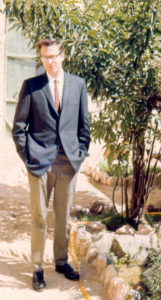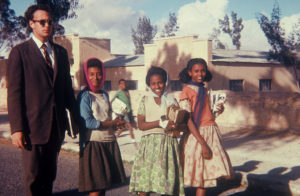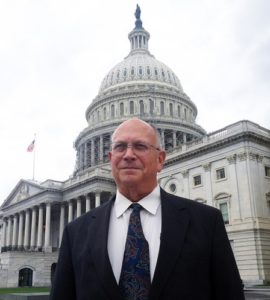John Stauffer, an Ethiopia VII PCV, got profoundly reconnected with Eritrea many years after his service there, when he learned that the regime that took control of the country following independence from Ethiopia in 1991, has been brutally oppressing the population in order to maintain absolute control. Over 400,000 Eritreans have fled the country, and Stauffer’s nonprofit, The America Team for Displaced Eritreans (www.EritreanRefugees.org) works daily to get assistance — material, legal, financial — to refugees and asylum seekers in many countries around the world… including in the United States. I recently interviewed John about his connection to Ethiopia and the Peace Corps and his efforts to help Eritrean refugees.
•
John, where are you from?
I’m originally from the Philadelphia area and still live here. I first attended York Junior College (now York College of Pennsylvania), and then transferred to Juniata College, Huntingdon, Pennsylvania.
Why the Peace Corps?
A. As I approached graduation from college, I realize that it would be the one opportunity I would have to do something far off and of value, before taking on the responsibilities of regular employment or of a family — so I applied to the Peace Corps, and requested that I be assigned to Ethiopia as a teacher.
You were assigned to Ethiopia?
Yes, we were Ethiopia VII and trained at Radcliffe College. Our site assignments, as you know, were given when we arrived in Addis Ababa. I was assigned to teach seventh and eighth grade in a middle school in Adi Caieh, in the province of Eritrea. I taught there with two other PCVs from 1966–68.

JohnStauffer always wore a jacket and tie when teaching
This assignment was a surprise, in that I thought I was to teach high school chemistry, chemistry having been my major in college. The name of the school was B.G. Lorenzo Tazaz Jr. secondary school. Lorenzo Tazaz was an Eritrean who wrote the speech given by HIM Haile Selassie to the League of Nations in June, 1936.
When you finished your tour what was your next step?
After I returned to the Philadelphia area, I applied to teach at private schools like Monson Academy in Massachusetts and Sidwell Friends School in Washington as I didn’t have any public school certification. I ended up taking an industrial position in marketing with Rohm and Haas Company, in Philadelphia and I remained with Rohm and Haas for 38 years. With the company I did a good bit of international travel, radio work, and training, all part of my marketing responsibilities.
What led you to set up this non-profit to help Eritreans fleeing their country?
In 2003, while I was still working, I was contacted by some former Eritrean students, who were now successful and moved to North America. They connected me with a former middle school student, and after I invited him to the United States for a visit, I learned what had befallen Eritrea following independence, at the hands of the brutal dictatorship.
So then, several Eritreans and a couple of Americans and I began efforts to address the difficulties in Eritrea, and eventually we focused on humanitarian aspects. We put 34 Eritreans refugees living in Ethiopia, through a three-year nursing school program.
We eventually incorporated as a Pennsylvania nonprofit, effective April 1, 2010. So it was the acute abuse facing many Eritreans at the hands of the regime, that led us to action – – and today, we get help (material and legal and protection) to Eritrean refugees and asylum seekers all around the world, ranging from China to Cambodia to Romania to Seychelles to Uganda, Ethiopia and Botswana, to Cuba to the United States – almost everywhere.
Are there any other RPCVs involved with your group?
The NPCA has taken an interest, has conducted a screening and panel discussion with our documentary, and has taken action with respect to helping refugees from various countries as they are resettled in the United States. There are several RPCVs who have contributed to our effort, but none are involved on a day-to-day basis.
What is your estimate of the number of Eritreans living in the U.S.?
I believe there may be as many as a couple hundred thousand Eritreans in the United States. Many are loyal to the offending regime, many are in opposition to it, including the asylees and refugees, and there are others who are indifferent, politically.
The largest concentration is in the Washington/Northern Virginia area, but there are populations in many urban areas such as Atlanta, Seattle, Dallas, Philadelphia, and Los Angeles. There are surprisingly few in the state of New Jersey.
Are you involved with the Eritrean community beyond your work helping them get resettled elsewhere?
Much of my time is involved with getting protection and safety to asylum seekers in various countries. I do participate from time to time with Eritrean conferences and social events. These, of course, are all involving oppositionists and refugees, and not loyalist activities.

John leaving school in Adi Caieh, with three 7th graders. The middle school in the background.
Have you been back to Eritrea (or Ethiopia) since your Peace Corps days?
No, I have not. Of course, I would not be welcome in Eritrea itself. I have attended a couple of conferences of the Presbyterian Ethiopia Network.
What is your take on Eritrea and what will happen with Ethiopia?
The situation between the countries is highly charged, politically, and I’d better remain neutral on that.
Have you stayed in touch with the Peace Corps and/or RPCVs from your group?
I have stayed in touch with one Volunteer whom I was within Eritrea; the third one has passed away. Occasionally, I hear from other Volunteers who served in Ethiopia.
How do you think (if at all) the recent Trump bans will affect your efforts?
Occasionally we are asked to assist with new refugee arrivals in the US, so these will stop, at least for a few months, per the executive order. Also, we get requests from refugees in other countries about how they might be resettled to the US., so there won’t be much we can suggest. There are thousands of Eritrean refugees in Sudan, and while some had been brought to the US by the State Department, the recent order will stop that indefinitely.
Beyond your Eritrean involvement, are you connected with the greater E&E community?
Only to a limited extent. I remain in contact with one volunteer from the early days of the PC in Ethiopia.
Have you tried to engage RPCVs from E&E with your struggles?
Years ago, I raised awareness of the Eritrean plight at an E&E reunion in Washington. I re-connected with Shlomo Bachrach there, and we later worked closely for several years on Eritrea issues, talking weekly, right up to his death. I was then written up in the group’s magazine; and presented our documentary at a reunion in Michigan in October, 2015; and then screened it at the NPCA conference in Washington in 2016.

John’s work today often takes him to Washington, DC where he sees officers in the State Department (Bureau of Population, Refugees and Migration; Africa Bureau; Human Trafficking; Int. Religious Freedom; Human Rights), Congressional staff, and various nongovernmental organizations (NGOs) including NPCA.
Finally, as we are a website that focuses primarily on books written by RPCVs, have you read (or seen) any of the memoirs written by RPCVs from the Horn of Africa…any of these books?
No, sorry, I have not. I passed along one PC book to the NPCA library, but I don’t recall what it was, or even if it was E&E.
John, many thanks for keeping up the good and necessary work…you are really fulfilling the Third Goal of the Peace Corps.
Yes, while an observer might ordinarily look at the Peace Corps experience as one of providing short-term assistance in a far-off place, the real and substantial impact is far beyond that: new or heightened humanitarian values are established with the volunteer as well as appreciation for the cultures and needs of others which can ultimately have profound impact on many, many others. And the influence on host country citizens can be, I’m sure, immeasurable and positive. I have witnessed and experienced all of this, and am pleased to share my observations.



Bravo!! Or, as we say in Turkish, Tebrik ederim (congratulations)!! The Third Goal alive!
I admire John’s good work and congratulate him. I’d be interested in his take on why so many Eritreans in the U.S. support the current Eritrean regime. The original EPLF was indeed a smart and humane organization. But that was long ago. Along the way, the thugs took over and the place now almost resembles North Korea. Why would any Eritrean support that?
I personally know Eritreans in the USA who support the Afewerki regime. I also have a friend who barely escaped being jailed by the regime along with others who were stalwarts in the independence war. I believe you, and many others, may have misunderstood what the original impetus for this sorry excuse for a government was. The thugs in control come from the same spring as the ones who led the war for freedom.
Hats off to John for giving full meaning to continuing service.
Mr. John ….I do not know how I should say thanks….you are kind and I witness you have a great sense of humanity. You helped me to earn degree in clinical nurse. Moreover, you gave me moral and guidance in my worst circumstances and cash assisstance too until I resettled in U.S.
May God bless you.
Mr. John,
I don’t know how you can help me, but I need your help. Since I came to America thirty years ago I was looking and searching in all directions to find my teacher. The years you were in Eritrea was the time Mr. Mick Lee used to be my teacher in Ethiopia. He is always in my mind. I made my contact with Peace Corps and news media, I couldn’t find him. I want to know if he is alive or not. If you know him, would you please help me to give me anything about him.
Sincerely,
Workye Zekarge
714 797 2160
I admire your work, John, and would like to help. I was in the Ethiopia 1 group and assigned to Tessenei (62-63) and Adi Ugri (more properly called Mendefera) in 63-64. During the liberation struggle (1961-1991) I was in contact with many Eritrean-Americans supporting the cause. I later came to know former fighters (tegadelai) and learned more Tigrinya in the U.S. than I had managed to pick up as a PCV! I visited Asmara right after liberation (1992) and made 3 more trips during the “good” years—1995 (working for the Ministry of Education for 2 months), and two summer tours with groups of 10-12 Americans in 1996 and 1997. The most notable was when Gloria Steinem joined a tour and promoted an initiative for girls’ education that remains a Peace Corps priority (although, sadly, not in Eritrea).
During the 1998-2000 border conflict with Ethiopia, I became a political operative for the Eritrean side—which I now regret, although I still believe Ethiopia was at fault in Badme. When Issayas arrested or banished his most democratic supporters (some of whom, like Bereket Habte Selassie and Haile wMenkarios I knew well) I realized that the leader’s dictatorial tendencies had been unleashed. Since then, I’ve sponsored or hired several Eritreans and maintained ties with a number of former students. I’m working with friends, but not on a wider scale, as you’ve done so valiantly. Along with you, I am cautiously optimistic, after years of weeping for Eritrea. I’m afraid my years of making a difference are over. Hope to see you at the 2019 E&E gathering in San Francisco.